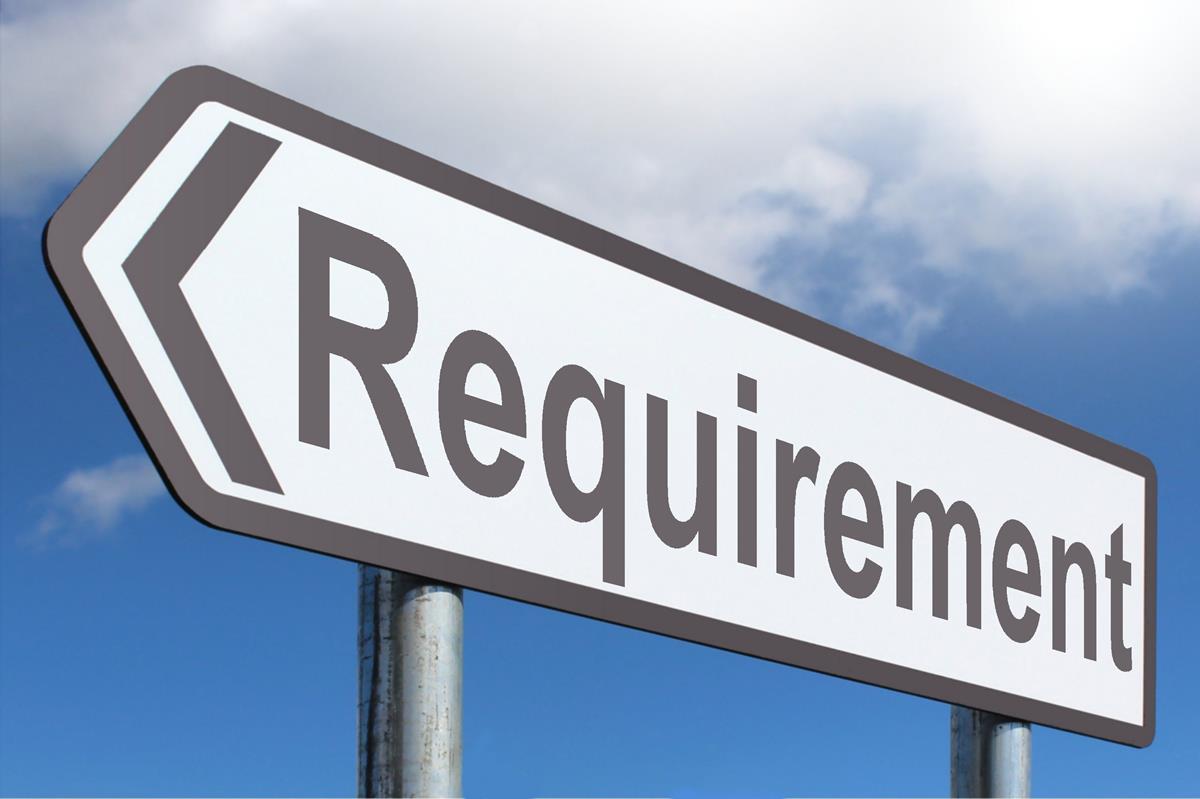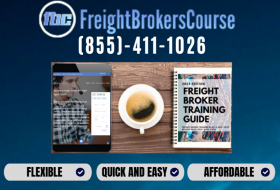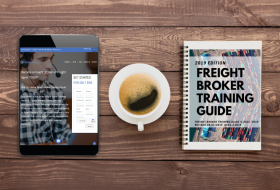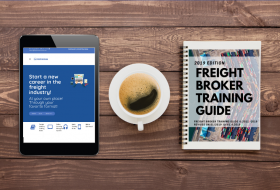All brokers must comply with all the requirements of the regulations in 49 CFR §371. These regulations require records to be kept and apply to how you conduct business. The FMCSA encourages you to familiarize yourself with these regulations; you can access them on the FMCSA Web site at www.fmcsa.dot.gov. Records, Rules, & Accounting A broker shall keep a record of each transaction. For purposes of this section, brokers may keep master database lists of consignors and the address and registration number of the carrier, rather than repeating this information for each transaction. The record shall show:
- The name and address of the consignor;
- The name, address, and registration number of the originating motor carrier;
- The bill of lading or freight bill number;
- The amount of compensation received by the broker for the brokerage service performed and the name of the payer;
- A description of any non–brokerage service performed in connection with each shipment or other activity, the amount of compensation received for the service, and the name of the payer; and
- The amount of any freight charges collected by the broker and the date of payment to the carrier. Brokers shall keep the records required by this section for a period of three years. Each party to a brokered transaction has the right to review the record of the transaction required to be kept by these rules. Misrepresentation When working as a broker, you may not do business, including advertising, in any name other than the name stated on your registration or operating authority.
- A broker shall not perform or offer to perform any brokerage service in any name other than that in which its registration is issued.
- A broker shall not, indirectly or directly, represent its operations to be that of a carrier. Any advertising shall show the broker status of the operation. Rebating &Compensation A broker shall not charge or receive compensation from a motor carrier for brokerage service where:
- The broker owns or has a material beneficial interest in the shipment.
- The broker is able to exercise control over the shipment because the shipper owns the broker, the broker owns the shipper, or there is common ownership of the two.
- A broker shall not give or offer to give anything of value to any shipper, consignor or consignee except inexpensive advertising items given for promotional purposes. Accounting Requirements, in Compliance with Regulation, 49 CFR §371.13 If you operate other businesses in addition to your brokerage, especially other transportation businesses such as motor carriers, then you must maintain your financial accounts so that revenues and expenses from your brokerage are separate from those of the other businesses. If your brokerage and the other businesses share common expenses, then your records must show which expenses belong to the brokerage. Doing Business Only with Motor Carriers Having Valid USDOT Numbers and Operating Authority, 49 CFR §371.105 As a household goods broker, you may do business only with a motor carrier that has a valid USDOT number and valid household goods motor carrier authority. You may not arrange transportation with motor carriers having only property motor carrier authority or household goods authority that is under suspension or has been revoked. You are encouraged to regularly verify the authority status of motor carriers that you do business with. You can check the status of a motor carrier’s operating authority by going to the FMCSA Licensing and Insurance Web site at http://li-public. fmcsa.dot.gov. When you arrive at that Web site, click “Continue” at the bottom. On the next webpage, click “Choose Menu Option” in the upper right corner. When the drop-down menu appears, click “Carrier Search.” On the next webpage, enter the motor carrier’s USDOT or MC number and click “Search.” You will see the results of your search, provided that the motor carrier is registered with FMCSA. If the carrier you are searching for appears, then choose either “HTML” or “PDF” to get a status report.
http://safer.fmcsa.dot.gov/CompanySnapshot.aspx
Things to Know before you Start First thing to start up the business professionally is to decide the form of business and giving it a name. Incorporation is not mandatory but recommended. Other forms that can be well considered are the sole proprietorship, partnership, Sub Chapter S Corporation and the Limited Liability Company (LLC). Incorporation can be easily processed without hiring an attorney. You can search for the Articles of Incorporation over the Internet. They are not more than two pages in length. The Federal Identification Number (FEIN) is needed for incorporation or partnership businesses. You need to apply to get the FEIN. However, for Sole proprietors, the Social Security Number is sufficient for completing the paper works. Forms of business you can consider for your freight brokering business:
- Incorporation
- Proprietorship
- Partnership
- Sub Chapter S Corporation
- Limited Liability Company
- UCR Registration (Page 9)
- SCAC Code Registration (Page 74) Regarding the selection of the business name, it can be your own name or any other name you would like your business to be called as. The name has to be unique and the broker needs to enquire that the name is available and not being used by someone already. The terminology used is a doing-business-as name or the fictitious name. A country or state level search can be done to confirm its availability. If the business you are planning is a partnership business then it is highly recommended to work out the partnership agreement. The partnership will form an outline for the scope of functions and expectations of each of the partner. The business set-up requirements for a freight broker are very basic and inexpensive. A toll-free number is highly desirable but not essential. We recommend using RingCentral.com for ALL your telecommunication needs. Using the RingCentral.com service allows you to have a virtual office. You can make UNLIMITED incoming and outgoing calls within the US and they give you a local fax line that will send PDF fax documents to your email, and you can get this package for around $30.00 a month. They also have more features you can read on their website: http://www.ringcentral.com Creating an office is quite simple as a freight broker. Being a freight broker is the perfect business that can be operated within the confines of your home. When you decide to increase the size of your brokerage by adding freight agents, a true office will definitely be needed at that time. Whether you’re telecommuting to your new office or working at home, running your freight, setting up your office requires some diligent thought and planning. Consideration needs to be made with thought to functionality, lighting, and ergonomics. Another important thing to remember that if you tend to take a home office deduction on your federal income tax return there are other issues you will be aware of. Startup requirements include:
- A personal computer.
- High-speed Internet connection: cable or DSL.
- A telephone with RingCentral.com.
- A reliable fax machine or RingCentral.com
- Filing cabinet
- Load Board membership (FindFreightLoads.com)
- Microsoft Office (Word & Excel Mainly)
- Email system (Gmail or Yahoo)
- Website – (Included with course)
15% OFF Packages above Basic.
For more info you visit www.freightbrokerscourse.com








